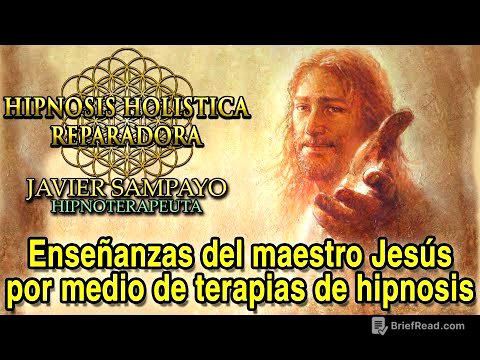TLDR;
This video outlines the path to attaining God, emphasizing that it's not achievable through material means but through divine grace and devotion. It explains the corruption of the senses, mind, and intellect by Maya, and how purification alone isn't enough. The key is to make these faculties divine through "Swaroop Shakti," attainable by begging for divine love and practicing specific sadhana. The video concludes with practical rules for sadhana, including observing silence and recognizing one's own shortcomings, to facilitate spiritual progress.
- God is the ultimate goal, attainable not through material means but divine grace.
- The senses, mind, and intellect must become divine through "Swaroop Shakti".
- Sadhana involves begging for divine love, chanting God's name, and meditating on His form.
- Practical rules for sadhana include observing silence and recognizing one's own shortcomings.
The Supreme Goal: Attaining God [0:10]
The ultimate goal of every soul is to attain God, our divine source, and serve Him. This attainment raises questions about how, who, when, why, and where it happens. God is divine and conscious, as are we, being parts of Him. However, an external power of God, Maya, dominates the soul, causing it to wander through 8.4 million life forms without changing its essential conscious nature.
Maya's Influence on the Soul's Servants [2:23]
Maya corrupts the soul's servants: the senses, mind, and intellect, which God provided to help the soul. These servants, including the five senses of perception and action, the mind, and the intellect, are diverted towards the material world. This corruption makes it impossible to perceive, know, or meditate on God, as God cannot be perceived by material faculties.
The Impossibility of Attaining God Through Material Means [6:34]
God cannot be attained through material senses, mind, or intellect. Even detachment from the world and purification of the heart through selfless karmayog and divine qualities are insufficient. A pure heart, though cleansed of impurities, remains material and unrelated to God, making it impossible for the mind to think of God.
The Need for Divine Faculties [11:16]
God cannot be related to any material thing, just as words cannot be comprehended by the eyes. To realise God, the senses, mind, and intellect must become divine, imbued with God's transcendental power. This transformation allows one to attain a direct audience with God.
The Essence of Sadhana: Detachment and Divine Grace [14:54]
Sadhana is the means to make the senses, mind, and intellect divine. It begins with detachment from the world, recognizing the lack of spiritual happiness in material pursuits. This path doesn't require striving for purification of the mind or self-realisation through conventional methods. Instead, it involves practicing sadhana that automatically purifies the heart, leads to self-realisation, and makes the faculties divine.
The Power of Divine Grace Over Austerity [17:46]
No amount of force, strength, strategy, or austerity can attain God. The only way to attain God is through His grace. Stealing or robbing from God is impossible due to His omnipresence and omnipotence. The only option is to beg from God, asking for His love, vision, and service.
The Nature of Begging from God [20:15]
Begging from God is not an insult but a right, as He is our true family. We are His heirs and have a right to our paternal property. Begging from worldly figures is futile, as they are also beggars. Instead, we should ask God for divine powers, His love, His vision, and to meet with Him.
The Role of Name and Form in Meditation [25:05]
To increase the longing to meet God, we must beg Him for divine love. Chanting God's name and meditating on His form are essential. God allows us to use any name or form, accepting it as His own, because He knows the soul cannot meditate on His real form. The mind is key to meditation, and the senses should also be engaged.
The Three Pillars of Sadhana: Shravanam, Kirtanam, and Dhyanam [27:45]
The essence of sadhana consists of three things: shravanam (listening), kirtanam (singing), and dhyanam (meditation). Shravanam involves listening to a God-realised Saint, while kirtanam means loudly singing God's name, qualities, and pastimes. Dhyanam, or meditation, involves creating a form of God in the mind and begging for His love.
The Importance of Dhyanam and Swaroop Shakti [32:55]
Among the three types of devotion, dhyanam (meditation) is foremost. By practicing devotion to God, one receives His personal power, swaroop shakti, which makes the senses, mind, and intellect divine. With these divine faculties, God comes under one's control.
Practical Rules for Sadhana: Silence and Humility [36:04]
Practical rules for sadhana include restraining the tongue and observing silence to prevent the mind from thinking of impure things. It is also essential to recognise that you are lowly, fallen, and sinful. Accepting this fact will end worldly disputes and facilitate spiritual progress.
Following the Rules for Spiritual Welfare [43:23]
Following the rules of sadhana, such as being present and on time, will lead to spiritual welfare. By consistently following these rules and continuing sadhana, one can achieve their destined goal and be fulfilled, even if it takes multiple lifetimes.








